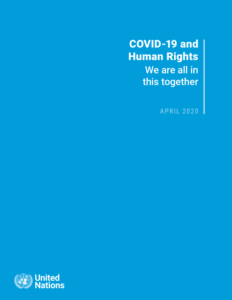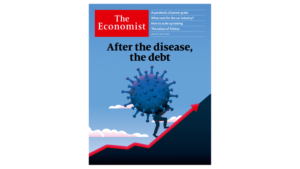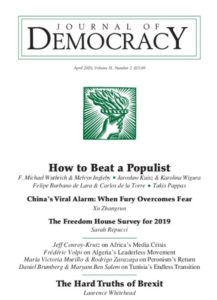The coronavirus pandemic must not be used as a pretext for authoritarian states to trample over individual human rights, or repress the free flow of information, the UN secretary general António Guterres warned today in a fresh attempt to bring the UN’s influence to bear on the crisis. He said what had started as a public health emergency was rapidly turning into a human rights crisis, the Guardian reports.
 “The pandemic could provide a pretext to undermine democratic institutions, quash legitimate dissent or disfavored people or groups, with far-reaching consequences that we will live with far beyond the immediate crisis,” says the report, COVID-19 and Human Rights: We are all in this together.
“The pandemic could provide a pretext to undermine democratic institutions, quash legitimate dissent or disfavored people or groups, with far-reaching consequences that we will live with far beyond the immediate crisis,” says the report, COVID-19 and Human Rights: We are all in this together.
Covid-19 is creating opportunities for autocrats and would-be autocrats to tighten their grip, the Economist notes. They must assume extraordinary powers, they insist, to protect public health. No fewer than 84 countries have declared a state of emergency since the pandemic began, says the Centre for Civil and Political Rights, a watchdog in Geneva. Some will surrender these powers when the emergency is over. Others plan to hang on to them. The danger is greatest not in mature democracies with strong checks and balances, such as America, but in places where such safeguards are weak, such as Hungary, the paper observes.
But in the midst of autocratic assertion there is democratic dereliction, analysts suggest.
 The COVID-19 pandemic has dramatically highlighted the absence of global democratic leadership as people on the European side of the Atlantic look at the richest and most powerful nation in the world with disbelief, the New York Times reports:
The COVID-19 pandemic has dramatically highlighted the absence of global democratic leadership as people on the European side of the Atlantic look at the richest and most powerful nation in the world with disbelief, the New York Times reports:
The country that defeated fascism in Europe 75 years ago next month, and defended democracy on the continent in the decades that followed, is doing a worse job of protecting its own citizens than many autocracies and democracies. There is a special irony: Germany and South Korea, both products of enlightened postwar American leadership, have become potent examples of best practices in the coronavirus crisis.
“I feel a desperate sadness,” said Timothy Garton Ash, a professor of European history at Oxford University and a lifelong and ardent Atlanticist.
Where once democracies might have acted in unison to blunt or solve global crises, disparate authoritarian states now frequently step into the breach and attempt to impose their will, notes Sarah Repucci, senior director for research and analysis at Freedom House.
 As authoritarians fortify themselves at home and extend their international reach, and as some democratic leaders adopt a myopic, self-serving, and discriminatory view of their official responsibilities, the world is becoming less stable and secure, and the freedoms and interests of all open societies are endangered, she writes for the Journal of Democracy.
As authoritarians fortify themselves at home and extend their international reach, and as some democratic leaders adopt a myopic, self-serving, and discriminatory view of their official responsibilities, the world is becoming less stable and secure, and the freedoms and interests of all open societies are endangered, she writes for the Journal of Democracy.
The current crisis, some fear, could act like an accelerator of history, speeding up a decline in influence of both the United States and Europe, the Times adds.
“America has not done badly, it has done exceptionally badly,” said Dominique Moïsi, a political scientist and senior adviser at the Paris-based Institut Montaigne. “Europe’s social democratic systems are not only more human, they leave us better prepared and fit to deal with a crisis like this,” he said.
 “Sometime in 2021 we come out of this crisis and we will be in 2030,” said Mr. Moïsi. “There will be more Asia in the world and less West.”
“Sometime in 2021 we come out of this crisis and we will be in 2030,” said Mr. Moïsi. “There will be more Asia in the world and less West.”
Mr. Garton Ash said that the United States should take an urgent warning from a long line of empires that rose and fell. “To a historian it’s nothing new, that’s what happens,” said Mr. Garton Ash. “It’s a very familiar story in world history that after a certain amount of time a power declines.”
Chinese human rights activist Dr. Yang Jianli, a survivor of the 1989 Tiananmen Square pro-democracy protests, tells the Human Rights Foundation’s COVIDCon how Xi Jinping’s regime silenced whistleblowers and dissidents in the early days of the coronavirus outbreak (above). The information he shared shows a stark contrast to what is portrayed by Chinese state media and begs the question: was China’s role that of savior or culprit?







